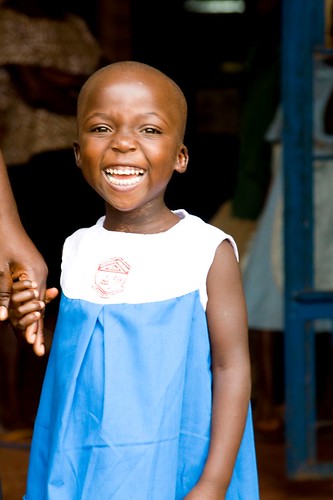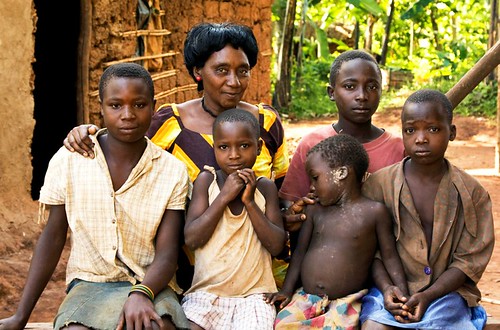Emma, the Balaza’s youngest son, stopped by the house yesterday and asked how I had been since last seeing me several weeks before. Fine, I was, but did you hear about the children? He had heard.
“It’s great, but exhausting. I didn’t have children, and then woke up one day and had five.” Emma smiled and I heard laughter from the kitchen and bedroom, Margaret and Stephen overhearing me, amused by my quick lesson in the hardships of childrearing, a way of life for Africans who conceive many at young ages, but not so much for mzungus, especially this mzungu. It’s a good lesson, they all agreed.
To say that I have been raising them the last two weeks on my own would be a lie. The Balazas and Ester have been working hard to provide for them, but since I am usually the only one in the house, Ester and Margaret at work and Stephen running errands to the village and Kampala, I am around the kids all day, cleaning wounds; administering medication; giving amaazi for dry mouths; handing food for empty tummies; getting tired heads to rest; wiping the muddied floor; telling dirty bodies off the couch; reminding no hitting, ask before you take, tell me where you are going, say thank you; asking where are your clean clothes, books, pencils?; teaching numbers, letters and words; filling the toilet with water over and again when the taps are dry only to have another child use it and leave a mess.
It’s the usual caretaking made more difficult by a language barrier, lack of most modern conveniences as well as the children’s poor education and wildness; they are generally polite and listen, and give me parental respect, including the customary kneeling when greeting me, but their previous free life in the village is somewhat at odds to their new, more sophisticated one of cleanliness, learning and adult supervision. And there is still lingering sickness; their former existence of unclean water, unwashed food, insufficient bathing and filthy beds still affecting their bodies. The coughs persist, strange blisters with puss appearing out of nowhere on knees, fungal patches silently emerging on forearms, and I suspect worms still residing in stomachs. And of course there is the infected leg.
The two youngest are home from school at midday; time to eat, and do homework with Sylvia, the seven year-old still in nursery, although she should be in her second year of primary school. She’s behind by a few years, as are all the others. Agnes was placed in P5 and Richard and Beatrice in P2, and these assignments were generous on behalf of the schools. Only Agnes spelled her name properly on the entrance exams. Richard got every answer incorrect taking the P2 test, a level for someone five years younger. On the name line he wrote: Watuh Out AIDS! On the level line below, he wrote: RVDGY, his version of Richard.
Beatrice taking entrance exam
“He saw it on the sign,” Ester said laughing. The schools here have painted signs on the buildings encouraging the children to do things like Avoid Bad Peer Groups, Keep Our Latrine Clean, Be a God Fearing and All Round Child, Speak English All [Of] The Time and my favorite, Wet Dreams Are Okay. I looked across the lawn. There was the AIDS sign.
“He didn’t even copy it right,” I said joining her in laughter, both of us shaking our heads. The boy claimed to have had some schooling. “What do they teach them in those village schools? How do you not teach a child to write his name?”
Ester told me that they mostly just play and sing songs in the village schools. Later, I would lament to Stephen the village teachers’ apparent total lack of professionalism. He would explain that teachers are paid next to nothing and the children are too undisciplined to learn much of anything anyway so they don’t even try. No excuse, I say. How can this country properly develop without at least a partially educated public?
My kids are doing their best to catch up with their peers, excited to have paper and pencils in the house to practice their letters and numbers, grateful to have someone looking over them, instructing them, guiding them, encouraging them in their learning. Rachel is indescribably excited to finally be in nursery and have a real uniform. I have never seen a child as genuinely happy as the day we enrolled her and she received her school dress. Ever since she has been laughing, smiling, dancing, just overjoyed.
“I can’t imagine them still being there,” I said to Ester the other day, referring to their old home. She shook her head. “I couldn’t even sleep that night we first saw them knowing they would have to be there another day.” She agreed. “Do you really think they would still be there if it wasn’t for us?”
“Yeah,” she said, “no one would take them.”
Traditionally it is the mother’s side of the family that is responsible for the children upon her passing. At the funeral, or more often, at the final funeral rites sometimes weeks or months later, the mother’s side of the family assesses the welfare of the children and decides if they need to intervene, either remove them from the father, or provide another woman to be the mother. Margaret tells me that usually the father will take advantage of the woman stepping in as the children’s caretaker especially if she is young, forcing her to become one of his wives. So now more often suffering children are simply taken and spread out among the relatives.
But nobody did anything at the mother’s funeral. All of the relatives scattered after the ceremony unable to take care of the children.
“You know there are many children like them,” Margaret tells me solemnly.
“What would happen to them if I wasn’t here?” I ask her. She sighed at the thought; fate’s mystifying turns leading to an American visit coinciding with their desperate need.
“I don’t know. Especially the little one. She was so sick. I just don’t know. We didn’t know how bad their situation was. It appeared very grave.” She paused. “You see we can’t do this [care for all of the children]. It’s too much. Maybe we give them some money, try to help a little, but that is all.”
“But they were worse than most. They weren’t being cared for.”
“Yes,” she agreed. “That man is very careless. You know. He didn’t like girls. So Agnes and the girls really felt it when the mother passed. He separated the boy from them, but he didn’t even care for his leg.”
The father actually came to the house a couple of days after we took the children. I was at the hospital with Richard, the other children at the house with Stephen. Stephen tells me he was in the back room when he suddenly heard talking from the other side of the wall. He stepped into the main room and saw the father standing there.
“He asked me why I took the children. I said, ‘You can’t manage them. Look how much better they are in just two days.’ I asked the children if they wanted to go back with him, and they said No.”
I laughed at the thought of all of them seated on the floor like good
The man couldn’t believe they were all in school, especially Agnes. Why would Agnes be in school? Stephen also told him that because the children were no longer under his care that didn’t obviate his responsibilities as their father. “You bring them food,” he directed the man. The man stalled, saying that a storm had killed all of his crops.
“Uggg! There is no way!” I exclaimed when retold the story. “We were just there the other day. He has so many crops!”
A week later a slovenly drunk showed up at the door saying that the father had fallen ill and needed the children to come look after him. We told the man to tell the father to go to the hospital if he was sick. The man came back a second day in the same dirty clothes with the same story. We all agreed that the father wanted the children to tend the fields. The third day the father himself came with tomatoes and maize in hand. No, he hadn’t sent that man the two days before. That man was a drunk and came on his own, and he didn’t know why. Here is some food for the children. Could they come back, so he can show the two youngest their plots? They haven’t received them yet, and surely he will die soon.
“If you want to leave them land, then you and I draft a will,” Stephen said to him.
Margaret scoffed to me, “That man. How are young children ever to remember which plot is theirs?”
“Ahh. He is lying,” Ester told me later. “He did the same thing when the mother was sick. She would stay here and Mummy and Daddy would care for her, and he would come pretending to be nice.”
Certainly none of us trust the act. We know his true self and we are enjoying watching the children very quickly take to their new lives without him; lives with shoes, underwear, mattresses, blankets, medicine, regular meals and school. I wish I could capture their sincere gratitude and joy when Ester and I took them to the open air market to purchase each of them school shoes and flip flops, and small book bags for the eldest three; or Richard’s reaction when I gave him one of my shirts since he only had one; it was a long sleeved top I got from a Father Joe Turkey Trot. His entire face changed, muscles moving and teeth showing that before I hadn’t seen. You would have thought I gave him the moon.
Sylvia practicing her letters
What the children have responded to most though is love. They needed it so badly. They yearned for it, deprivation etched on their little face, especially the youngest two. Stephen told them to call me mama the second day and they took to it like a butterfly floats. After his suggestion, they looked at each other smiling, wide-eyed and speaking to each other in Lugandan punctuated by the word mama. Not a few minutes later they were calling for me; mama. At first I was apprehensive, not wanting them to think I was now their mama only to eventually lose me as well, but Ester explained the word as a sign of respect for caretakers; a name not reserved exclusively for one’s mother like in
Ester tells me that when the mother was lying in the hospital bed in her final moments she was crying “My children. My children,” knowing they would suffer under the father’s control. I wish I knew her then. I wish I could have given her some comfort as she died, promising her that the children would be okay.











I am truly touched. You have made such a difference in so many lives. I love you.
ReplyDeleteyour Mother
Their mother is watching from above and thanking you everyday!
ReplyDelete-h